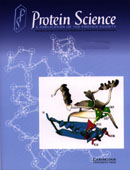Crossref Citations
This article has been cited by the following publications. This list is generated based on data provided by
Crossref.
Crnogorac, Milan M.
Ullmann, G. Matthias
and
Kostić, Nenad M.
2001.
Effects of pH on Protein Association: Modification of the Proton-Linkage Model and Experimental Verification of the Modified Model in the Case of Cytochrome c and Plastocyanin.
Journal of the American Chemical Society,
Vol. 123,
Issue. 44,
p.
10789.
Lubman, Olga Y.
and
Waksman, Gabriel
2002.
Dissection of the energetic coupling across the src SH2 domain-tyrosyl phosphopeptide interface.
Journal of Molecular Biology,
Vol. 316,
Issue. 2,
p.
291.
Waldron, Travis T.
Modestou, Modestos A.
and
Murphy, Kenneth P.
2003.
Anion binding to a protein–protein complex lacks dependence on net charge.
Protein Science,
Vol. 12,
Issue. 4,
p.
871.
Sano, Daisuke
and
Omura, Tatsuo
2005.
Construction of a Cloning System for the Mass Production of a Virus-Binding Protein Specific for Poliovirus Type 1.
Applied and Environmental Microbiology,
Vol. 71,
Issue. 5,
p.
2608.
Velazquez-Campoy, Adrian
Goñi, Guillermina
Peregrina, Jose Ramon
and
Medina, Milagros
2006.
Exact Analysis of Heterotropic Interactions in Proteins: Characterization of Cooperative Ligand Binding by Isothermal Titration Calorimetry.
Biophysical Journal,
Vol. 91,
Issue. 5,
p.
1887.
Montin, Katy
Cervellati, Carlo
Dallocchio, Franco
and
Hanau, Stefania
2007.
Thermodynamic characterization of substrate and inhibitor binding to Trypanosoma brucei 6‐phosphogluconate dehydrogenase.
The FEBS Journal,
Vol. 274,
Issue. 24,
p.
6426.
Armstrong, Kathryn M.
and
Baker, Brian M.
2007.
A Comprehensive Calorimetric Investigation of an Entropically Driven T Cell Receptor-Peptide/Major Histocompatibility Complex Interaction.
Biophysical Journal,
Vol. 93,
Issue. 2,
p.
597.
Todorova, Niya A.
and
Schwarz, Frederick P.
2008.
Effect of the phosphate substrate on drug-inhibitor binding to human purine nucleoside phosphorylase.
Archives of Biochemistry and Biophysics,
Vol. 480,
Issue. 2,
p.
122.
Martinez-Julvez, Marta
Abian, Olga
Vega, Sonia
Medina, Milagros
and
Velazquez-Campoy, Adrian
2012.
Allostery.
Vol. 796,
Issue. ,
p.
53.
Velazquez-Campoy, Adrian
Leavitt, Stephanie A.
and
Freire, Ernesto
2015.
Protein-Protein Interactions.
Vol. 1278,
Issue. ,
p.
183.
Vega, Sonia
Abian, Olga
and
Velazquez-Campoy, Adrian
2015.
A unified framework based on the binding polynomial for characterizing biological systems by isothermal titration calorimetry.
Methods,
Vol. 76,
Issue. ,
p.
99.


